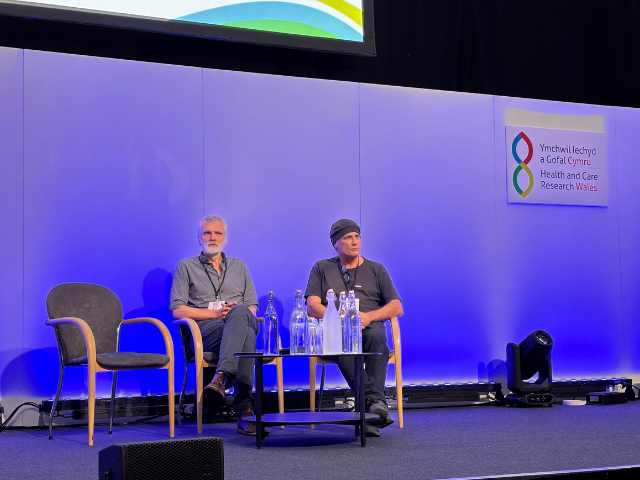
The power of AI to transform health and social care research
29 October
At the tenth Health and Care Research Wales conference, Professor Stuart Allen, Director of the Centre for Social Care and Artificial Intelligence Learning (SCALE) and Professor Reyer Zwiggelaar, Senior Research Leader at Health and Care Research Wales, shared expert insights into how artificial intelligence (AI) is reshaping research in social care and health.
Both speakers emphasised that AI holds enormous potential to enhance the effectiveness, efficiency and humanity of care, provided it is developed and applied responsibly. They agreed that interdisciplinary collaboration, transparency in design, and ethical awareness are essential to ensure AI supports people rather than replaces them.
Professor Allen said that at the SCALE Centre, their work brings together expertise from social care and computer science to develop technology that meets real-world needs.
He said: “Artificial intelligence offers the potential to build smarter, more agile and more effective social care services. We must be truly interdisciplinary because technology only matters if it meets people’s real needs.”
He highlighted how AI tools could assist social workers by summarising research or simplifying access to data. He said:
These tools should support humans, not replace them. We must make sure no one is left out because of a digital divide or lack of access.”
Professor Allen also addressed the ethical challenges of AI in social care settings. He continued: “If we can’t explain an AI decision, it shouldn’t guide someone’s care. AI has great potential, but we must always keep the human heart at its centre.”
Professor Zwiggelaar reflected on a career that began before the modern era of AI. He said: “When I started my journey, there wasn’t AI. It was called computer vision.”
His early research explored how computers could assist radiologists in detecting abnormalities. These initial studies showed that subtle prompting could help clinicians identify issues more effectively, laying the foundation for decades of innovation in medical image analysis.
He described developing techniques to identify and classify linear structures in mammograms, which marked a breakthrough in detecting speculated lesions. These methods were later extended to other medical fields, improving retinal and vascular imaging and directly benefiting hospitals in Liverpool and China by making screening more efficient and patient care more responsive.
Professor Zwiggelaar’s teams also demonstrated how AI could track abnormalities over time, linking mammography to histology and predicting disease progression. These advances have helped reduce invasive procedures and improve diagnostic precision.
Looking ahead, Professor Zwiggelaar highlighted the importance of transparency. He said:
The bottom line is to actually improve medical understanding. We don’t want a black box, our aim has always been to understand.”
Revisit the full conference programme.